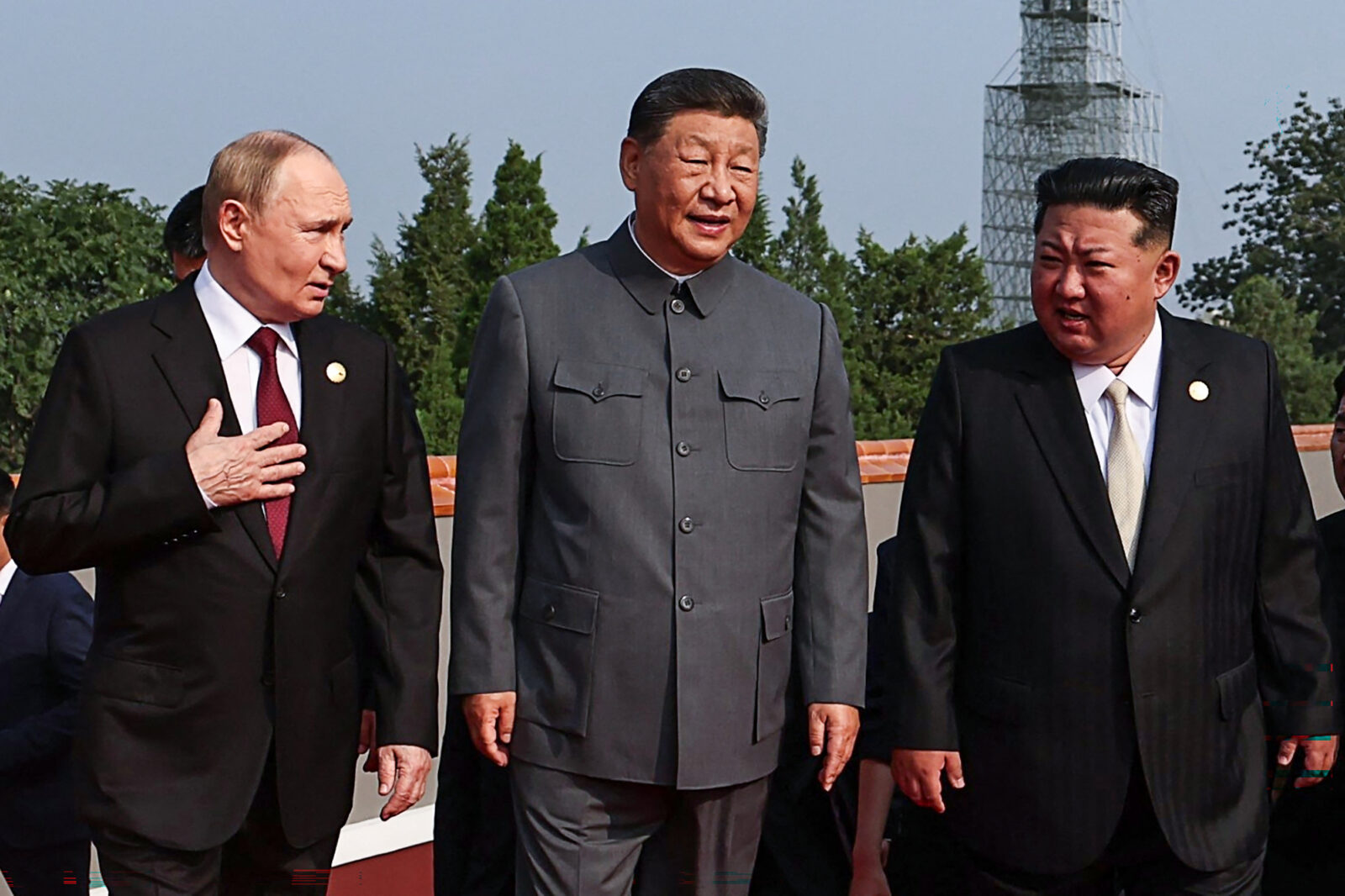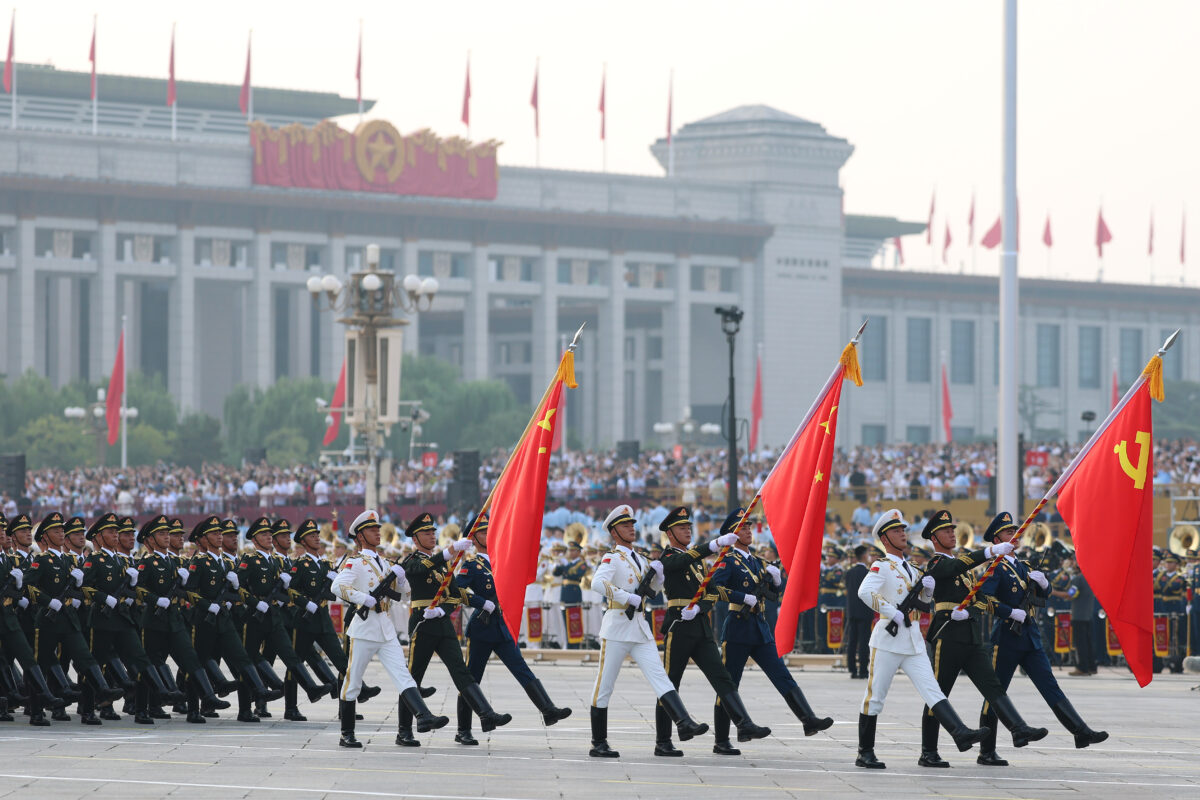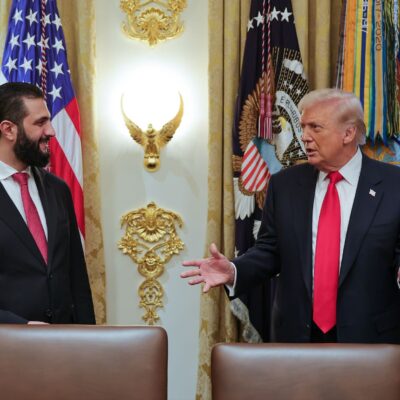
Alexander KAZAKOV / POOL / AFP) (Photo by ALEXANDER KAZAKOV/POOL/AFP via Getty Images
China uses WWII memory to project power in military parade and international diplomacy
The parade was an example of how Beijing has used WWII not only to encourage nationalism, but to project power internationally, from Jerusalem to Taipei and beyond
China showcased its growing aggressiveness on the world stage in a major military parade on Wednesday, showing off missiles and fighter jets to mark the 80th anniversary of Japan’s surrender in World War II with Russian President Vladimir Putin and North Korea’s Kim Jong Un in attendance.
The parade was an example of how Beijing has used WWII not only to encourage nationalism, but to project power internationally, from Jerusalem to Taipei and beyond.
President Donald Trump pushed back against the spectacle in Beijing, writing on Truth Social that Chinese leader Xi Jinping ought to “mention the massive amount of support and ‘blood’ that the United States of America gave to China in order to help it secure its FREEDOM from a very unfriendly foreign invader. Many Americans died in China’s quest for Victory and Glory. I hope that they are rightfully Honored and Remembered for their Bravery and Sacrifice! …Please give my warmest regards to Vladimir Putin, and Kim Jong Un as you conspire against The United States of America.”
The parade came shortly after China hosted a summit with Putin, Indian Prime Minister Narendra Modi and other Eurasian leaders, deepening ties among major powers not aligned with the West. The attendees issued a communique last week strongly condemning “the military aggression launched by Israel and the United States against Iran” in June.
China has also used World War II and Holocaust terminology in recent weeks as it continues its hostility against Israel, calling Israel’s war a “genocide,” even as the Chinese Embassy in Israel held an event highlighting Beijing’s positioning with the Allies in World War II.
The recent statements reflect a broader double game China has played in its relations toward Israel, consistently showing hostility to Israel on the international stage since the Oct. 7, 2023 Hamas-led attacks, while within Israel, the Chinese ambassador has pursued a friendlier posture.
Last month, Beijing, in a statement from the Chinese Communist Party’s Information Office, accused the U.S. of “serving as an accomplice to the genocide in Gaza.” The statement, Tuvia Gering, a fellow at the Atlantic Council and the Institute for National Security Studies at Tel Aviv University, said, marked the first time an official Chinese document accused Israel of genocide.
Gering told Jewish Insider that “you see the word [genocide] being used more and more by Chinese academics, and they are the ones who help formulate China’s Middle East policy … In recent months, I have been seeing it used much more frequently, as well as other accusations against Israel and Jewish people.”
“From the beginning of the war, there have been comparisons between the Jewish state and Japanese imperialists,” Gering said. “From the Chinese perspective, [Japan] did some of the most terrible things, like what the Nazis did to us. That vile, inhumane violence is ingrained in every child in China’s psyche from a young age.”
The Chinese consul-general in Osaka, Japan, has published posts on X over the course of the Gaza war comparing Israel to Nazis and “a demon … that will even devour a baby,” and saying “we must get rid of it once and for all.” Beijing has not apologized for the diplomat’s statements.
That being said, Gering posited that the use of the word “genocide” was unlikely to reflect a policy shift by Beijing “because of the sensitivity to how the word is being used against China” in relation to its Uyghur minority.

The genocide accusation came in response to the State Department’s report on human rights practices in China in 2024, which opened by stating that “Genocide and crimes against humanity occurred … in China against predominantly Muslim Uyghurs.”
As such, Gering said the use of “genocide” in an official document is primarily meant to target the U.S.
Similarly, Carice Witte, founder of SIGNAL Group, a think tank focused on China-Israel relations, told JI that the statement is an example of Beijing “using Israel as a tool.”
To China, she said, “the Middle East and Israel are much more about great power competition than the local issues.”
“Israel is a very small country that is no longer of great interest to China, and its positions on Israel are not about Israel as much as they are about China’s global interests,” Witte said. “By saying the U.S. supports genocide in Gaza, that is not about Israel, but about the U.S. and the global south. Because so many countries hate Israel, [China] believes that if they criticize Israel, more countries will support them.”
A source involved in China-Israel relations who spoke on condition of anonymity told JI they heard a Chinese diplomat say that “they use the Palestinians to make trouble for the U.S. the way the U.S. uses Taiwan to make trouble for them.”
Ten days after Beijing accused Israel of genocide, the Chinese Embassy in Israel held a ceremony marking 80 years since the end of World War II in the Pacific arena, and honoring “Jakob Rosenfeld, a Jewish doctor whose heroic contribution to the Chinese people’s fight against fascism is a lasting symbol of international solidarity,” the invitation read.
Gering also noted that China has made diplomatic use of the fact that over 20,000 Jews escaped the Holocaust to Shanghai, including, famously, the entire Mir Yeshiva from Lithuania. They fled to an enclave in Japanese-occupied Shanghai that did not require a visa for entry, until 1941, when Japan forced the Jewish refugees into a ghetto and banned Jewish immigration to the city. The only Chinese diplomat known to have played a role in helping Jewish refugees was a representative of the Republic of China, which the Chinese Communist Party that currently rules China later defeated in a civil war.
Like many other countries, including China’s ally Russia, which also holds WWII victory parades, Beijing “employs selective historical memory,” Gering said. “There is a very obvious, explicit utilization of memory … Undermining or silencing the voices of victims of the Holocaust and refugees in Shanghai … When you listen to Chinese ambassadors, you think that there was a unique civilizational benevolence by the Chinese people, who opened their arms when the rest of the world rejected Jews … It’s a complete distortion of the story of the Jewish refugees who lived in squalid conditions.”
Israel generally does not push back against that narrative for “political expedience,” Gering said, explaining that “it is good for soft power to say we share their sentiment of anti-fascism.”
Witte said that China’s politicization of World War II and the Holocaust reflects a broader “two-pronged path. On the one hand, China has a big-picture policy and the Beijing stage is for the track that is harsh on Israel. Local policy, where the embassy is the stage, is the pro-Israel track.”
“Obviously, Beijing is exponentially louder, more recognized and more heard than the embassy,” she added.
Gering pointed out that Chinese Ambassador to Israel Xiao Junzheng, who arrived at his post in December, “emphasizes friendship between Jews and Chinese people, while Chinese propaganda says Israel is committing genocide and compares Jews to Nazis.”
Xiao “has been given a mandate to act like nothing [bad] happened,” Gering added. “He even wrote an article saying not to let the war define the relationship. Even though … [the CCP] legal advisor said the Hamas attack [on Oct. 7, 2023] was A-OK, don’t split hairs, let’s talk about Chinese cars and how many Jews we saved. They’re kind of forgetting about Jews living today.”
**
Gering also expressed concerns about Beijing’s recent use of Nazi terminology to describe the government in Taiwan.
The CCP newspaper, People’s Daily, published an article that compared Taiwan’s President William Lai and the ruling Democratic Progressive Party to the Nazis. The article also described civil society groups seeking to educate Taiwanese citizens to be prepared for possible missile attacks from China and to recognize Chinese propaganda in the media as “Nazi-like.”
The article “even feigns concern for their democracy, which is ironic in a CCP mouthpiece,” Gering said.
Gering expressed concern that the language is similar to that used by Russia in the years before its invasion of Ukraine.
“The denazification card is what Putin’s Kremlin used as a pretext for its invasion and its ongoing war in Ukraine,” Gering noted. “This prompts us to ask if this is a precursor to a People’s Liberation Army [Chinese military] denazification campaign in Taiwan.”
Still, Gering said, Taiwanese politics are very divisive, and opposition politicians have also called the current government Nazis, leading to condemnation by Israeli and German diplomats in Taipei. “That gave a hechsher [kosher certification] for the CCP to use this kind of pernicious rhetoric, as well,” he said.
“In the more immediate term, it’s probably just a tactical way for the CCP to sow division and weaken the Taiwanese leadership and democratic institutions,” he added.






